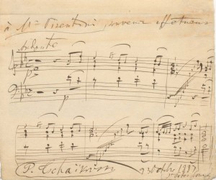Happy Birthday, Brahms and Tchaikovsky!
Thursday, May 7, 2015

This post is an excerpt of an article by David Plylar that originally appeared on the Library of Congress’s “In the Muse” blog.
On May 7, Brahms and Tchaikovsky share a birthday—an annual event since Tchaikovsky waltzed into the world in1840, seven years after Brahms. Recognition of this coincidentally shared date might provide an excuse to look in the Library’s depths for any links between our Tchaikovsky and Brahms collection items.
I did locate one scrap of Tchaikovsky’s music in manuscript (image, above left): a few measures from the overture to his opera Tscharodeika (or Charodeyka, “The Enchantress,” composed between 1885 and 1887) in a piano reduction (I believe the ornamental arpeggios and registers here are unique to this version, though variants of it appear in the second statement of the theme in the orchestral version).
Since the tiny scrap of Tchaikovsky’s music above is rather obscure, it is only fair to search out something in a similar vein in Brahms’ output.
Rinaldo (op. 50, 1863-8) was something of an experimental foray for Brahms, and perhaps as close as he came to operatic writing. After the immediate success of the Requiem, Rinaldo’s decided lack of it was a disappointment to Brahms, who would never really return to the same realm in his vocal music—which is not to say that he did not write significant dramatic music for the voice and large forces thereafter; he regrouped with the Alto Rhapsody (op. 53) and Schicksalslied (op. 54), for instance, composed between 1868 and 1871. The Library of Congress houses the holograph manuscript of Rinaldo, also a part of the Moldenhauer collection:

Johannes Brahms, Rinaldo, Moldenhauer Archives at the Library of Congress
You may notice that the title listed here is different than it is in the published version. In the manuscript it is Rinaldo v. Göthe. The text for Rinaldo was drawn from Goethe’s adaptation of the fourteenth canto of Tasso’s epic Gerusalemme liberata. Tasso’s musical legacy is richly represented at the Library (we have Liszt’s major orchestral work Le triomphe funèbre du Tasse, for instance), and of course there is the more well-known opera Rinaldo by Handel (which includes the popular and beautiful aria “Lascia ch’io pianga”); although we do not have the manuscript, the Library of Congress does have several early editions of selections from Handel’s Rinaldo dating from between 1711 and the early 1720s.
To find out a connection between Brahms’s Rinaldo and the music of Tchaikovsky, continue reading on In the Muse.
Image, above left: P.I. Tchaikovsky, Quotation from Tscharodeika, Library of Congress, Moldenhauer Archives, Box 53.
Share Tweet EmailKategorie: Jubiläen

